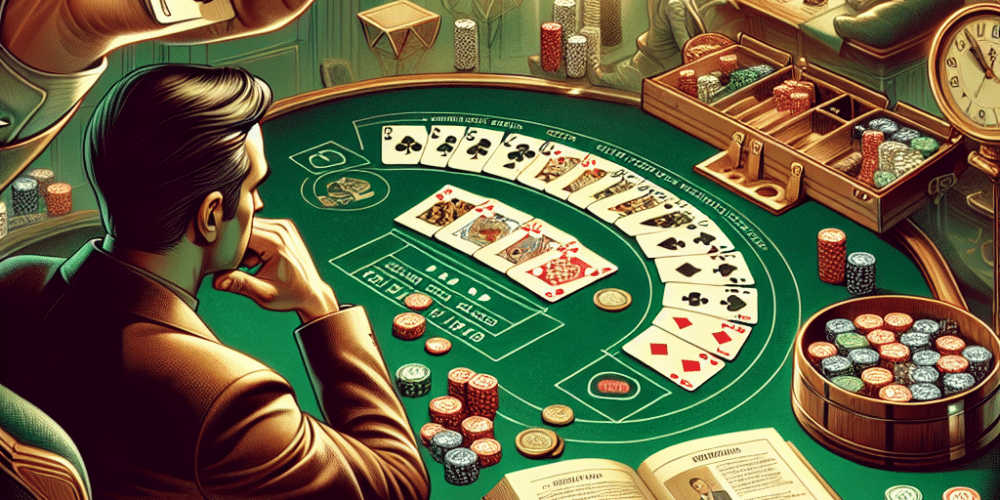Understanding the Basics of Pai Gow Poker
Pai Gow Poker, a blend of traditional American poker and the Chinese game of Pai Gow, involves both luck and strategic planning. A common mistake is underestimating the importance of setting both your high (five-card) and low (two-card) hands optimally. A strategic misstep here can drastically reduce your chances of winning.
Essentially, your goal in Pai Gow Poker is to create two poker hands out of seven cards that you believe will beat the dealer’s equivalent hands. Mastery of hand-setting tactics is essential. The five-card hand must always be stronger than the two-card hand. For instance, if dealt a flush and a pair, the flush should go into the five-card hand and the pair in the two-card hand, maximizing your strengths across both hands.
Hand Setting Strategies
One effective strategy is the “House Way,” a standard method used by casinos for setting hands. Learning this can not only help you understand how dealers set their hands but also sharpen your own skills in hand setting. Another strategy is balancing strength; don’t focus all your high cards in the five-card hand unless leaving a competitive two-card hand. For example, if you have Ace-Ace-10-8-7-5-3, placing the two aces in the two-card hand and 10-8-7-5-3 in the high hand could be more beneficial than other combinations.
Advanced Pai Gow Poker Strategies
Playing the Odds
Understanding the odds and how they change according to the composition of your hand is crucial in Pai Gow Poker. For example, if you hold no pairs, straights, or flushes, the best approach generally is to place the highest card in the five-card hand and the next two highest cards in the two-card hand. This maximizes the strength of both hands under weak circumstances.
Banker Role
Another advanced strategy is taking the role of the banker whenever possible. While not all casinos allow this, playing as the banker can lower the house edge and give you the advantage of winning any copies (tie hands). However, remember that you must cover all bets on the table when you are the banker, so be sure your bankroll can handle the potential losses.
Bankroll Management in Pai Gow Poker
Effective bankroll management is crucial, as Pai Gow Poker games can last a long time with lots of pushes (ties), which can either slowly drain or incrementally increase your funds. It’s advisable to set a loss limit and a win goal. For instance, you might decide to stop playing if you lose $100 or after you win $200. This strategy helps protect your bankroll and keeps your gaming experiences positive.
Choosing the Right Table
Selecting a table with minimum bets aligning with your bankroll strategy can also significantly impact your financial stability. Opt for tables that allow the lowest minimum bets while considering your overall strategy and bankroll size, as this will enable you to play longer and potentially capitalize on the role of the banker more frequently.
Enhancing Your Winning Chances
Understanding the Payouts and House Edge
Pai Gow Poker usually offers a flat payout structure, but there’s typically a 5% commission on winnings. Understanding these aspects can influence your betting strategy and how aggressively you play as the banker. Additionally, knowing the house edge in various scenarios can help you make smarter decisions about splitting your hands.
Coping with Variance
Pai Gow Poker is marked by low variance, meaning it’s common to push. Patience is vital, and the ability to handle streaks of non-winning hands will stand you in good stead.
Practical Takeaways
To excel at Pai Gow Poker:
– Always set your hands optimally by focusing on creating the strongest possible two-card hand that still allows a stronger five-card hand.
– Consider taking the banker role to reduce the house edge.
– Practice excellent bankroll management by selecting tables appropriately and setting clear limits.
– Learn and adapt the house way of setting hands to improve your strategy.
Pai Gow Poker combines the excitement of poker with strategic intricacies. By mastering both the technical skills involved in setting hands and the finer points of game strategy, such as when to play as the banker, players can significantly enhance their enjoyment and profitability in the game.

















